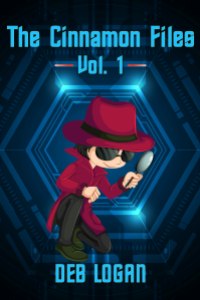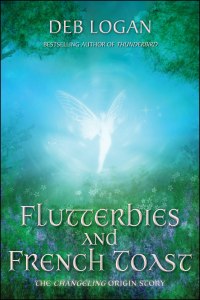This free fiction is part of The Infinite Bard project. A new story will be linked to the IB site every other week, so be sure to check back often!
*~*~*

The Windfall Apple
Deb Logan
I ran down the lane toward Marjorie’s homestead, my sturdy leather boots pounding the packed earth of the path. The winter snows had receded, but the ground was still cold and hard. The early spring breeze was still cool enough to redden my cheeks and I was glad of my warm jacket and woolen mittens. For once I didn’t even mind that my blonde curls were tucked up inside a red knit cap.
I’d raced through my chores that morning and begged Ma’s leave to visit Jorie to witness the spectacle. Ma shook her head, amazed that I would want to see all those God-forsaken heathens parading past the Miller homestead, but she’d given in at last. With her final reminder to keep a safe distance from the savages ringing in my ears, I’d pocketed a withered apple from last fall’s harvest and bolted out the door.
The breeze, though still chilly, held the promise of spring. A soft, sweet smell of burgeoning green life and dark, rich soil. Jorie’s father was already in the fields, breaking sod for the year’s planting, but he’d set his sons to watch the road. The Miller’s wanted no trouble from the filthy injuns traipsing past their land.
Jorie and I giggled as we took our places safely behind her brothers. She’d watched the procession every day, but I’d only heard tell of it before. My eyes widened in amazement at the hundreds of red skins plodding down the road. I’d never seen so many folk in one place. They were like a river flowing past Jorie’s place. A dirty, smelly river to be sure, but what could you expect from heathens who didn’t know no better?
“Sure glad they’re not stoppin’ here,” said Jed, Jorie’s eldest brother. Though we all knew that the end of their trail, the Indian Territory, wasn’t far enough from our home in Fayetteville, Arkansas.
“Might be a good thing to let them know they’re not welcome here abouts,” Ben suggested.
“What’ve you got in mind?” asked Jed.
“Ma tossed a passel of rotten fruit from the root cellar this morning,” Ben answered with a sly grin. “Fancy a little pitchin’ practice?”
Shock zinged through my belly. I’d never done nothin’ as wicked as throwing squishy, nasty fruit at another person, but that didn’t stop me from loading up my apron with ammunition. After all, filthy injuns didn’t really qualify as people.
* * *
The soldiers told us we would reach our destination within the week. I didn’t believe them. My life had been reduced to an endless trail of misery. I would walk until I died, just as my mother and sister had. My father hadn’t even begun the journey, dying of fever while still penned within that horrible stockade.
The sun shone in a cloudless blue sky, but it shed no warmth. The snow had finally gone and this piece of road was packed and dry, but my blistered feet found no relief. The leather boots I’d worn on the day of removal had long since fallen to pieces. Now my only shoes were blood-stained rags.
I closed my eyes and plodded on, following my uncles and the mothers of my clan. I couldn’t smell the sweetness of the day, only my own foul stink and that of my people. I’d forgotten what it was to be clean and well-fed and content.
All of life’s goodness had been stripped from us along with our homes and land. No joy remained in the world. Only tears and despair and this endless trail.
Once I was a daughter of the Tsalagi, Cherokee in the white man’s tongue. A maiden on the verge of womanhood. Now I was nothing. A starving stick-figure without family or home or hope.
Sometimes at night, as I lay huddled on the ground with only one thin blanket and the warmth of my clan mothers’ bodies to protect me from the cold, I dreamed of home; of what was no more. Of the father and mother and little sister who loved me. Of our village, deep in the ancestral lands of the Tsalagi Nation. Of our fields of sweet corn, plentiful beans, and plump, healthy squash.
The Great Spirit gave those lands into our care and we loved them. The mountains and valleys carved by the wings of the Great Buzzard, the rocks marked by the frightful claws of Uktena, the horned serpent. The Creator set the first man and first woman of the Tsalagi in that land, and we had remained.
Until the Americans saw that it was good and determined to take it for themselves.
Now we had nothing. Only the clothes we had worn when the soldiers drove us from our homes. We hadn’t been allowed to carry anything away. Everything now belonged to the state of Georgia. Our land. Our homes. Even the possessions within our homes.
Our Principle Chief, John Ross, had fought long and hard for our rights. Other nations were removed from their lands, but John Ross and our tribal council fought using the American’s own laws. They took our cause all the way to the American’s Supreme Court…and won.
We celebrated when news of that victory reached our village. The Chief Justice, a white man named John Marshall, had decreed that we were a sovereign nation and that Georgia had no right to claim our lands.
But the soldiers came anyway and drove us into stockades like cattle.
The American President, Andrew Jackson, had defied the courts and sided with the state. Our nation was at an end. Our lands were forfeit. We were forced to march to a place no one else wanted: the Indian Territory.
I shook myself from the despair of my memories and tried to see beauty in the day. I paused on the road, longing to sit down and rest my blistered feet, but knew I didn’t dare. Mounted soldiers patrolled our march and I’d seen more than one straggler whipped into line.
Laughter reached my ears and I glanced toward the welcome sound. No one laughed on our miserable trail.
Four young whites, about my age, raced toward us. Two boys and two girls, their pockets and aprons bulging.
I watched them warily. I no longer expected anything good from white American hands.
* * *
Jed and Ben and Jorie and I raced down the lane toward the river of plodding red skins. As soon as we drew nigh, the boys started pelting the savages with rotten fruit. Jorie and I had to get closer; we weren’t as skilled at throwing as the boys.
I took aim at a girl about my age who’d stopped to stare at us. Imagine! A filthy injun with the gall to look a white girl in the eye.
But I’d run too close. I could really see her. Could read the expression in her eyes. Despair. She didn’t even care that I looked about to lob something at her head. No older than me and she didn’t expect any kindness from the world.
Shame rose in my chest and near to suffocated me. What was I doing? Adding to the burden of a girl already so worn down by trouble she could barely stand? She might be a God-forsaken heathen, but what kind of Christian was I to heap more abuse on her head?
I dropped the nasty, squishy plum, and let all the other rotten fruit fall from my apron as well. Instead, I reached into my pocket and pulled out the windfall apple I’d planned to share with Jorie. I held it out to the injun girl.
She glanced from me to the apple and back again, a quizzical look in her eyes.
“Go ahead,” I said. “You can have it.”
She took it from my hand and raised it to her nose. Closing her eyes, she inhaled deeply … and relaxed.
I’d never seen anything like it. One minute she looked near to fainting with exhaustion and despair, and then she sniffed that apple and her whole demeanor changed. She stood straighter and it looked like the weight of the world lifted from her shoulders.
Just from the smell of a withered, windfall apple.
She opened her eyes and reached into a cotton bag hung over her shoulder. Next thing I knowed, she was holdin’ a corn dollie out to me.
“It’s all I have to trade,” she said when I accepted the toy. “It was my little sister’s.”
Grief and loss and longing filled her eyes with so much emotion I don’t know how she held it in. I gave the dollie back quick-like. No way would I take the last memento of her dead sister. Not in exchange for a withered apple.
“That’s all right,” I said. “I don’t need no trade. Enjoy the apple.”
A tiny, sad smile touched her lips. “Thank you.”
She held that apple like it was made of gold and started walking on down the road. But her back was a little straighter and her step a little lighter than before.
“Hey,” I called after her. “What’s your name?”
She paused and, glancing back at me, seemed to consider. “The white missionaries used to call me Emily.”
I watched Emily go until she disappeared in the stream of her people, then I hitched up my skirts and ran for home. Thankful every step of the way that I had a home and a ma and pa to run to.
I intended to ask Ma for a basket of windfall apples. I wanted to hand them out to the injun children on the road. Ma was a good Christian woman. When I explained about Emily, I knowed she wouldn’t begrudge those poor savages a basket of apples.
Besides, I’d seen blessed few children among that river of folk.
Emily’s voice came back to me. “It was my little sister’s.” I shivered, and praised God Almighty for the safety of my home and family.
|
|











